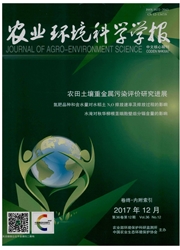

 中文摘要:
中文摘要:
通过现场采样调查及室内分析测试,研究了石油污染土壤经过10个冻融循环和恒温处理后,土壤中过氧化氢酶和脲酶的活性、土壤呼吸速率、水溶性有机碳及微生物量碳的变化特征。结果表明,冻融作用对中重度污染土壤中过氧化氢酶和脲酶的活性有促进作用,过氧化氢酶活性提高6.64%,脲酶活性增加41.11%,但对土壤微生物量碳影响不大;水溶性有机碳受冻融作用影响较大,其比恒温处理提高67.04mg·kg^-1,且土壤中总石油烃含量越高,水溶性有机碳变化越大;中重度石油污染土壤经过冻融处理后.其石油烃含量较之恒温处理减少明显,两种不同处理的差值达290.268mg·kg^-1,而对于高度石油污染土壤来说,冻融作用则可能不利于石油烃的降解。
 英文摘要:
英文摘要:
In northeast China climatic regions, soils may be subjected to freeze-thaw cycles which occur frequently in late winter and early spring. Freezing may have strong effects on soil physical properties, microbial activity and microbial community. Microbial biomass and soil enzyme activity could have valuable influence on microbial degradation in contaminated soil. This paper studied the variations of catalase (CAT), urease activity, microbial biomass carbon, respiratory rate and water-dissolved organic carbon in petroleum contaminated soils after 10 freezing-thawing cycles (FTCs). The results showed that freezing and thawing of contaminated soils did not have a strong effect on soil microbial biomass C, while catalase activity and urease activity were increased due to the FTCs, the increasing rate of CAT and urease activity in soil was 6.64% and 41.11%, respectively. Water dissolved organic carbon (DOC) in soil after freezing and thawing treatment was increased 67.04 mg·kg^-1 compared with soil without FTCs, and a significant correlation existed between DOC and TPHs (total petroleum hydrocarbons) concentrations. Compared with soils without FTCs, the concentrations of TPHs in soil moderately contaminated with petroleum decreased more after freezing and thawing treatments, the difference between the treatments was 290.268mg·kg^-1; however, high concentration of TPHs in soil might have an negative effect on its degradation. Although freeze-thaw cycles can alter soil microbial biomass and enzyme activity, their overall impact on microbial degradation in contaminated soil remains unclear.
 同期刊论文项目
同期刊论文项目
 同项目期刊论文
同项目期刊论文
 期刊信息
期刊信息
